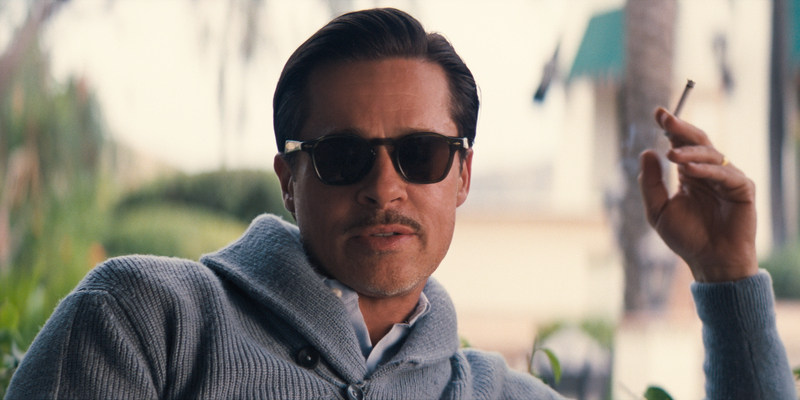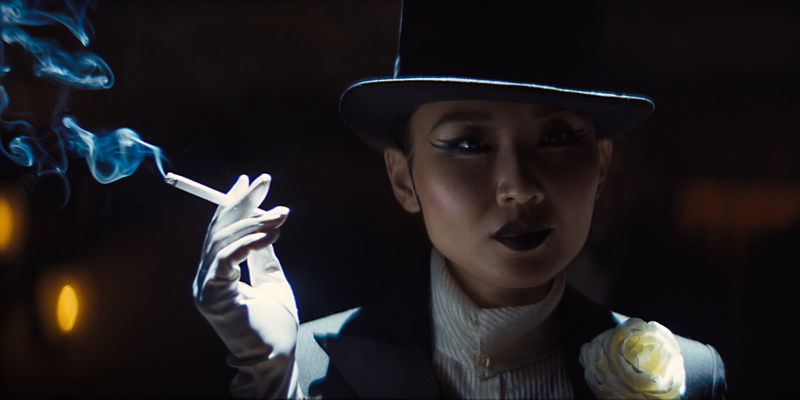
Review by
Eric Hillis
Directed by: Damien Chazelle
Starring: Brad Pitt, Margot Robbie, Diego Calva, Jean Smart, Jovan Adepo, Li Jun
Li, Tobey Maguire, Katherine Waterston, Eric Roberts, Samara Weaving

Singing in the Rain gets its own Snyder cut courtesy of
Damien Chazelle, who takes the central hook of that musical
favourite, removes the song and dance numbers (oddly for the director of
La La Land) and turns it into a bloated three hour drama that mostly consists of
scenes and subplots pilfered from other movies. When Paul Thomas
Anderson decided to make his own riff on Gene Kelly and Stanley Donen's
film, he swapped its setting – the dawn of Hollywood's sound era – for
the dawn of the VHS porn era. Chazelle doesn't even bother offering us a
new backdrop, sticking with the theme of various Hollywood figures
adjusting to the shift to sound films in the late 1920s. The director
can't be accused of trying to hide his film's debt to
Singing in the Rain, with one character even watching that movie at one point, an effect
akin to a Friday the 13th sequel featuring Jason settling
down to watch John Carpenter's
Halloween.
The central figure is Manny Torres (Diego Calva), a young
Mexican employed as a Hollywood fixer whose job sees him entrusted with
ensnaring everything from a film camera to an elephant. He also helps
out with "sensitive" situations, like the nod to the Fatty Arbuckle case
that opens the film, in which a young actress overdoses at a party. This
opening party resembles an outtake from a Baz Luhrmann movie as
Chazelle's camera tracks through rooms filled with debauchery, turning
the screen into a living, breathing, fucking Hieronymous Bosch painting.
The scene introduces us to the rest of the movie's central players.
Margot Robbie is Nellie LaRoy, a brash blow-in determined to do
whatever it takes to become a star. Brad Pitt is Jack Conrad, an
icon of the silent screen known for his many failed marriages and
drinking problems. Jean Smart is Elinor St. John, a Hedda
Hopper-esque gossip columnist whose words can make or break stars and
studios. Jovan Adepo is jazz trumpeter Sidney Palmer.
Li Jun Li is Lady Fay Zhu, a seductive lesbian modelled after
silent star Anna May Wong.

The inclusion of the latter two characters might be considered
Chazelle's reaction to criticism of his previously centering white
protagonists in two movies about jazz. Their stories have the potential
to be more interesting than the characters played by Calva, Robbie and
Pitt, whose stories we've seen multiple times. But Chazelle sidelines
Palmer and Zhu, positing them as one-note victim props as once again a
filmmaker uses non-white characters to assuage his white liberal guilt.
They have no substantial narratives of their own and exist merely to show us how
terrible white (and brown) people are.
The bulk of the narrative is based around Torres, and while Calva is a
quiet sensation in the role, his rise and fall narrative is so poorly
sketched it's difficult to buy into. Torres goes from general dogsbody
to studio executive in an unfeasibly short space of time, given
countless unlikely opportunities to succeed. It might be described as a
story of how power corrupts, except Torres is pretty corrupted from the
beginning, bribing cops, sneaking comatose actresses out of parties and
stealing an ambulance so he can run red lights and get a camera to a
movie set before the light fades. Torres might be wide-eyed but he's
certainly no innocent. Such an approach would be refreshingly honest
were it not for the feeling that Chazelle doesn't really understand just
what an asshole his protagonist is from the off.

Pitt's Conrad is a hybrid of the Gene Kelly character from
Singing in the Rain and the moody male protagonist of
every variation of A Star is Born. The part sees Pitt grapple with the irrelevance bestowed upon him by
the sound era, but casting a fifty-something in the role confuses
things. Surely the issue wouldn't be so much his struggles with dialogue
but rather the fact that he's past his sell by date? When he asks St.
John why he's no longer relevant we're baffled as to why her answer
isn't simply "Because you're 55!" Chazelle uses Conrad to verbalise some
of his thoughts on the importance of cinema, which means we get a
monologue from Pitt that's as cringey as Ryan Gosling's "Why Jazz
matters" sermon from La La Land. As someone who has an undying love of both cinema and jazz, even this
writer rolled his eyes in both moments.
As the sociopathic social climber LaRoy, Robbie gives us another
variation of her Harley Quinn schtick, which is really getting tiresome
at this point. It seems Robbie has decided the only American accent
she's capable of pulling off is a "New Joisey" parody, and I guess we're
stuck listening to it. Torres and LaRoy have a decidedly unromantic
romance that never comes off as anything more than lust on the part of
the former. Chazelle appears determined to evoke
The Great Gatsby with this subplot but it reminds us more
of that awful Baz Luhrmann adaptation than any literary classic.

Elsewhere Chazelle fills his movie with reenactments of famous Old
Hollywood anecdotes and reworkings of scenes from other movies. The
Alfred Molina sequence from Boogie Nights has Molina
replaced by the not so threatening Tobey Maguire and its ominous
firecrackers by a constantly spitting henchman. The latter element is
symptomatic with the film's odd fascination with bodily fluids. The most
surprising aspect of Babylon is its toilet humour, with
characters – both human and animal – constantly vomiting and shitting
themselves in immature attempts at comedy. It's not so much shits and
giggles as well, just shits. Some of the comic vignettes are in dire
need of editing, like a sequence involving Robbie's LeRoy having her
first crack at a dialogue scene. There's so much flab on these scenes it
makes Judd Apatow seem economical. Speaking of editing, there are some
decidedly misjudged scene transitions, with Chazelle cutting from a
moment of tragedy to an immediate sight gag. I guess he's trying to make
a point about how disposable people are in Hollywood, but if the people
in the movie don't care about one another, how can we be expected to
care about them?
On the plus side, this is a Damien Chazelle movie, which means we're
gifted another great Justin Hurwitz score. The horn-led score
never sounds like a product of the film's period and has more in common
with the exotica craze of the 1950s, but it certainly evokes the
coke-fuelled rush of Hollywood's golden age and does a lot of the film's
heavy lifting. If nothing else, following Michael Flatley's
Blackbird, Babylon offers another rare chance to see the great
Eric Roberts on the big screen. In what comes off as a nod to his
role in Bob Fosse's Star 80, Roberts plays the father/manager of Robbie's LeRoy and manages to
make us sit up with his few minutes of unhinged Robertsness in a way the
rest of the movie never quite manages.

